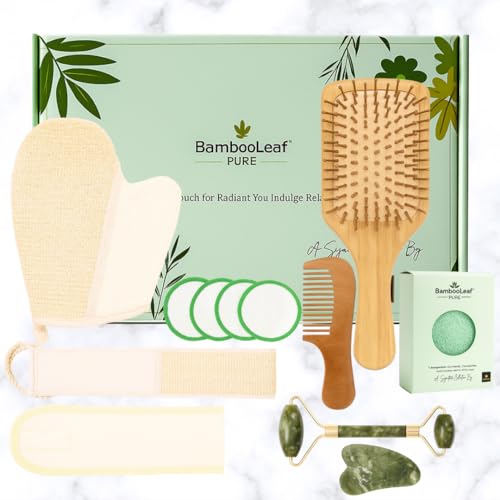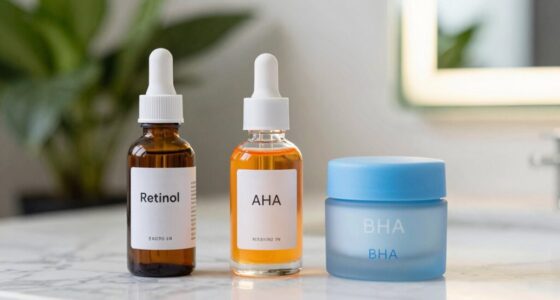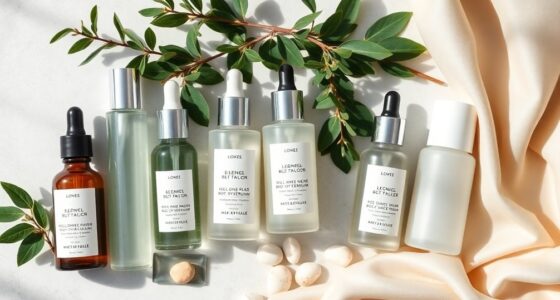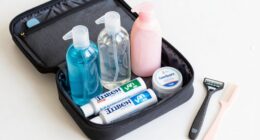Labels like “clean,” “natural,” or “chemical-free” often seem trustworthy but can be misleading, hiding the real safety, effectiveness, and environmental impact of products. Science helps you understand which ingredients truly benefit your skin or hair and reveals whether they are safe and sustainable. Relying solely on labels can lead you to choices based on marketing hype rather than facts. To make smart decisions, it’s helpful to see what research and science say about ingredients—there’s more to uncover beyond the label.
Key Takeaways
- Labels like “natural” or “clean” can be misleading; scientific evaluation of ingredients is essential for safety and efficacy.
- Scientific research clarifies how ingredients work, their benefits, stability, and potential risks, beyond what labels suggest.
- Natural ingredients are not automatically safer or more effective; science helps distinguish beneficial components from allergens or irritants.
- Environmental impact depends on sourcing and harvesting practices; scientific insights inform sustainable choices in natural ingredient use.
- Making informed decisions requires analyzing scientific evidence and environmental factors, not just relying on labels or marketing claims.

Have you ever wondered what’s really in your beauty products? It’s easy to get caught up in the labels boasting “clean,” “natural,” or “chemical-free,” but understanding what these claims truly mean can be confusing. When you look at the ingredients list, you might see a mix of natural ingredients and synthetic ones. Natural ingredients often sound appealing because they evoke images of plants, herbs, and pure extracts. But just because something is labeled natural doesn’t automatically mean it’s better or safer. Sometimes, natural ingredients can cause allergies or sensitivities, and they’re not always the most effective. That’s where science comes into play, helping us understand how different ingredients work and whether they actually benefit your skin or hair.
Natural labels don’t guarantee safety or effectiveness; science helps us understand what truly benefits skin and hair.
One of the main reasons many people gravitate toward clean beauty is the desire to reduce environmental impact. Natural ingredients are often touted as environmentally friendly because they come from renewable sources and tend to be biodegradable. However, it’s important to remember that harvesting these ingredients in large quantities can still have a significant environmental footprint. Overharvesting, habitat destruction, and the use of pesticides can harm ecosystems. When you choose products with natural ingredients, you’re supporting a movement towards more sustainable practices, but it’s essential to look beyond just the label and consider how ingredients are sourced and processed. Scientific research can also reveal how ingredient stability affects product safety and efficacy over time.
Science helps cut through the ambiguity by providing evidence-based information about how ingredients behave and their safety profiles. For example, some synthetic ingredients might be more stable and less likely to cause irritation than their natural counterparts, which can spoil or degrade faster. Conversely, certain natural ingredients have proven benefits backed by research, like plant extracts with antioxidant properties. The key is to understand that labels alone don’t tell the full story. You need to consider both the scientific data and the environmental implications of ingredients to make informed choices.
Ultimately, the goal is to find a balance between using products that are effective, safe, and environmentally responsible. While natural ingredients can be appealing, they aren’t always the best option for every concern or skin type. Science provides the tools to evaluate ingredients objectively, helping you avoid fads and focus on what truly works. By scrutinizing labels, understanding scientific research, and considering environmental impact, you can make smarter decisions about what you put on your skin and how it affects the planet. Clean beauty isn’t just about avoiding chemicals; it’s about making choices rooted in knowledge, sustainability, and efficacy.

REXSOL Revitalizing Shampoo Scientifically Formulated to clean thinning hair (240 ml / 8 fl oz)
Gently cleans scalp and hair follicles of excess sebum and cholesterol stimulated by dihydroxytestrone,one of the factors believed…
As an affiliate, we earn on qualifying purchases.
As an affiliate, we earn on qualifying purchases.
Frequently Asked Questions
Are Natural Ingredients Always Safer Than Synthetic Ones?
Natural ingredients aren’t always safer than synthetic ones because natural safety depends on ingredient purity and individual sensitivities. You should look beyond labels and consider scientific evidence, as some natural substances can cause allergic reactions or irritation. Conversely, synthetic ingredients are often tested for safety and consistency. Always research both natural and synthetic options, and choose products tailored to your skin’s needs for the best safety and effectiveness.
How Do I Verify a Product’s Scientific Claims?
To verify a product’s scientific claims, you should check ingredient transparency and look for references to scientific studies. Read labels carefully, and research any ingredients that seem questionable. Trust brands that openly share research backing their claims, and consult reputable sources like scientific journals or dermatologists. This way, you can confidently assess whether the product’s claims are supported by credible evidence, ensuring you make informed choices.
Can Clean Beauty Products Cause Allergic Reactions?
Yes, clean beauty products can cause allergic reactions, especially if they contain ingredients with high irritation potential. Even products labeled hypoallergenic aren’t guaranteed to be suitable for everyone, as individual sensitivities vary. To minimize risks, check ingredient lists carefully, perform patch tests, and choose products designed for sensitive skin. Remember, natural ingredients aren’t always hypoallergenic and can still trigger allergies or irritation.
Is There Regulatory Oversight for Clean Beauty Labels?
Regulatory oversight for clean beauty labels is limited, so you should scrutinize claims carefully. There are some regulatory standards, but they often lack strict enforcement, affecting labeling accuracy. Companies may label products as “clean” or “natural” without strict verification, so it’s crucial to do your research. Always check ingredient lists and look for third-party certifications to make sure the product meets your standards and isn’t just label deception.
Do Clean Beauty Products Perform as Well as Conventional Ones?
You’ll be surprised to learn that 80% of clean beauty products perform on par with conventional ones. Their success often depends on ingredient safety and sourcing, ensuring effective results without harmful chemicals. While some might worry about efficacy, brands investing in quality ingredient sourcing tend to deliver comparable, if not better, outcomes. So, you can trust that clean beauty products aren’t just about labels—they’re about real performance backed by science.

velona Sweet Almond Oil – 64 Fl Oz | 100% Pure and Natural Carrier Oil |Cold Pressed | Skin, Hair, Body & Face Moisturizing | Use Today – Enjoy Results…
Sweet Almond Oil: 100% Pure and Natural Carrier Oil. Cold Pressed. Not Diluted, Non-GMO, No Additives, No Fragrance,…
As an affiliate, we earn on qualifying purchases.
As an affiliate, we earn on qualifying purchases.
Conclusion
In the world of clean beauty, labels can be misleading, and science can be complex. You need to read carefully, question critically, and stay informed. Labels may promise purity, but science reveals the truth behind ingredients. You must look beyond the claims, understand the facts, and make choices that truly protect your skin and health. In the end, your awareness, your research, and your vigilance are what guide you to genuine, safe beauty—beyond the labels and into the science.

Self Care Natural Unique Organic Spa Set for Women – Eco Friendly Gift Box with Bamboo Comb, Jade Roller, Facial Sponge, Makeup Remover Pads, Headband & Bath Glove – Birthday, Relaxation Kit
🌿 Complete Organic Self-Care Kit – Includes 7 natural beauty essentials: bamboo hair comb, jade roller, Facial sponge,…
As an affiliate, we earn on qualifying purchases.
As an affiliate, we earn on qualifying purchases.
![[ Volufiline 10ml ] Cosmetic Ingredient - 100% Volufiline 10ml(0.34 fl. oz) France SEDERMA | Cosmetic Grade | For face and body Improve Skin Elasticity, Wrinkle Improvement](https://m.media-amazon.com/images/I/31zgXRk1bLL._SL500_.jpg)
[ Volufiline 10ml ] Cosmetic Ingredient – 100% Volufiline 10ml(0.34 fl. oz) France SEDERMA | Cosmetic Grade | For face and body Improve Skin Elasticity, Wrinkle Improvement
100% pure Volufiline, raw material made by France Sederma and repacked by COSMETIC BOOSTERS.
As an affiliate, we earn on qualifying purchases.
As an affiliate, we earn on qualifying purchases.










